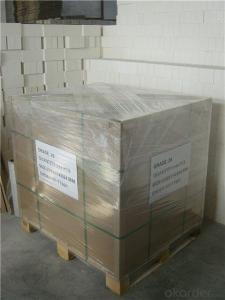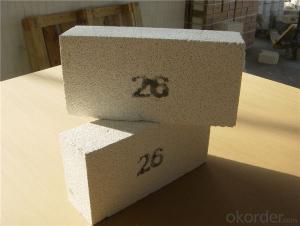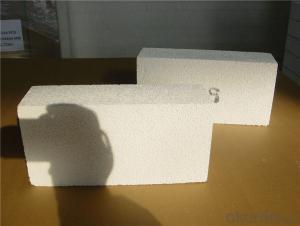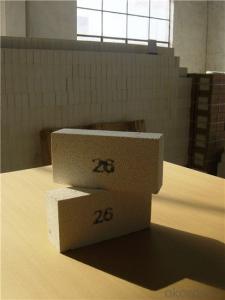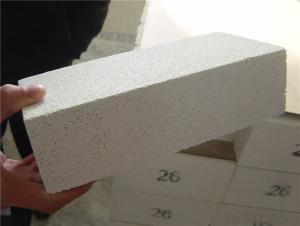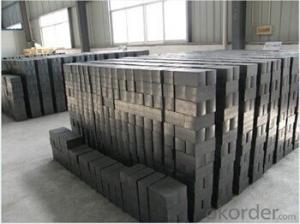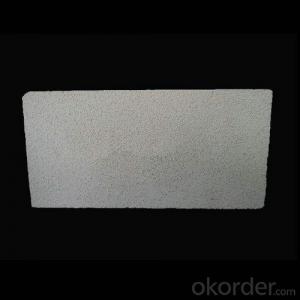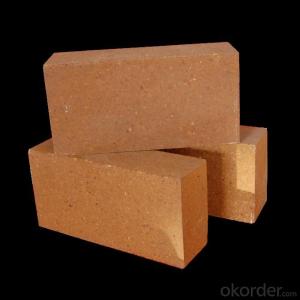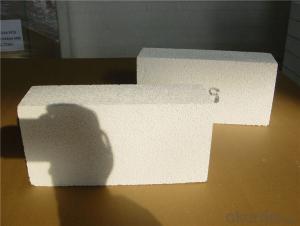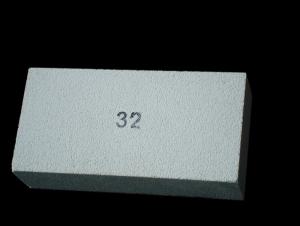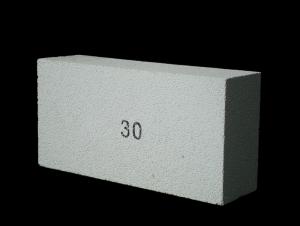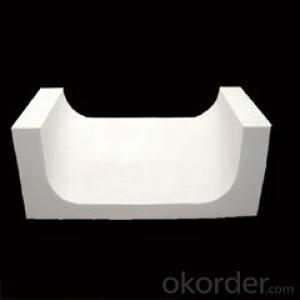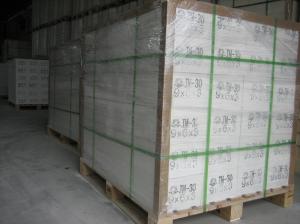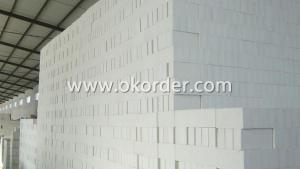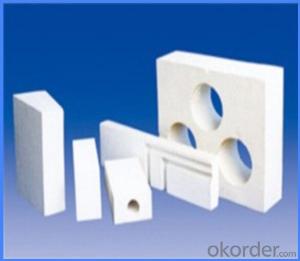Far Infrared Heating Fire Clay Insulation Clay Bricks
- Loading Port:
- Shanghai
- Payment Terms:
- TT OR LC
- Min Order Qty:
- 1 m.t.
- Supply Capability:
- 1000 m.t./month
OKorder Service Pledge
OKorder Financial Service
You Might Also Like
Thermal Insulation Fire Clay Brick
Refractory brick is a block of refractory ceramic material used in lining furnaces, kilns, fireboxes, and fireplaces.
We provide high quality Refractory Fire Bricks that are used on wide range in the various industries like Cement, Glass and Steel. Refractory Fire Bricks are provided as per the quantity and specifications required by the customers. We provide an extensive range of Refractory Fire Bricks at reasonable prices that depend upon the quantity ordered.
Application
Insulating Fire Brick are used for the lining of converter, alternating current arc furnace, direct Current arc furnace and the ladle slag line, etc.
Company Advantage
(1)Long Insulating Fire Brick manufacture history: 25 years manufacturer
(2)Advanced equipment
(3)Diversification of production standards: ISO ANSI FEPA JIS ASTM
(4)Flexible payment: T/T L/C D/P D/A
(5)Professional marketing team and after-sale service
Insulating Fire Brick main feature:
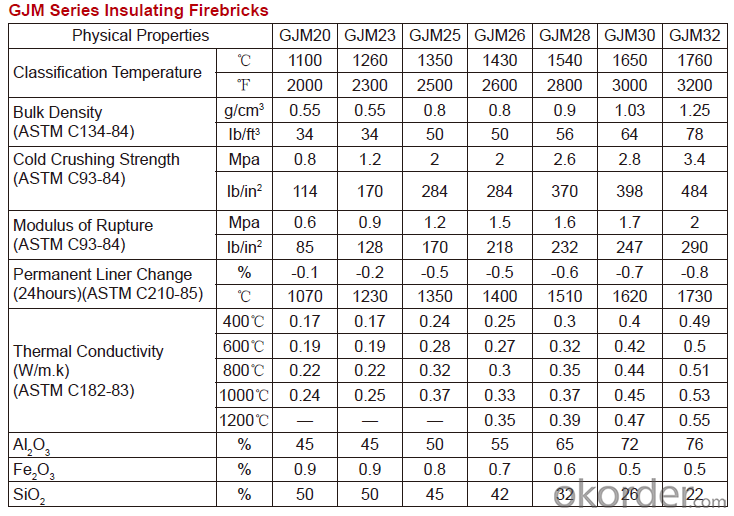
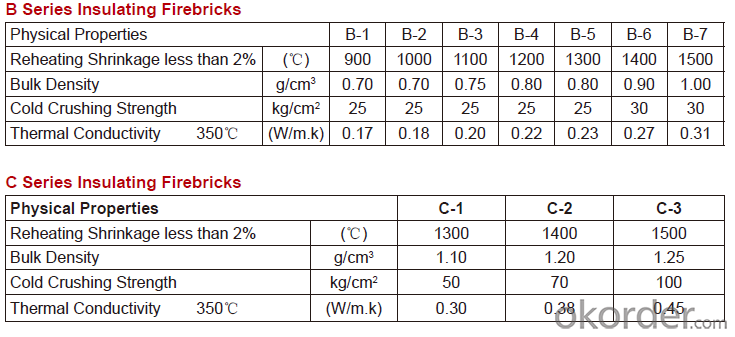
Equipment
1 unit of Ceramic Abrasive (SG Abrasive) pilot production line
2 units of Compact grain Abrasive pilot production lines
1 unit of high-end coated abrasives (abrasive cloth) production line
2 units of Boron Carbide production lines
3 large flexible crushing and sieving lines for grit production lines
6 units of 5000KVA-10000KVA dumping type electric arc furnaces for Brown Fused Alumina fusion
Q1 What’s the transport method?
A1 FCL delivery goods with wooden pallet or wooden case by sea; If LCL delivery, must with wooden case; Sometimes need open top, flat rack or bulk cargo.
Q2 What’s the required payment term?
A2 Generally 30% TT as the prepayment, 70% TT before delivery. If need, 100% Irrevocable Letter of Credit or negotiation.
Q3 Which country are our products exported to?
A3 Apart from entire Chinese market, the US, Russia, Japan, Korea, Australia and some Southeast Asian Nations.
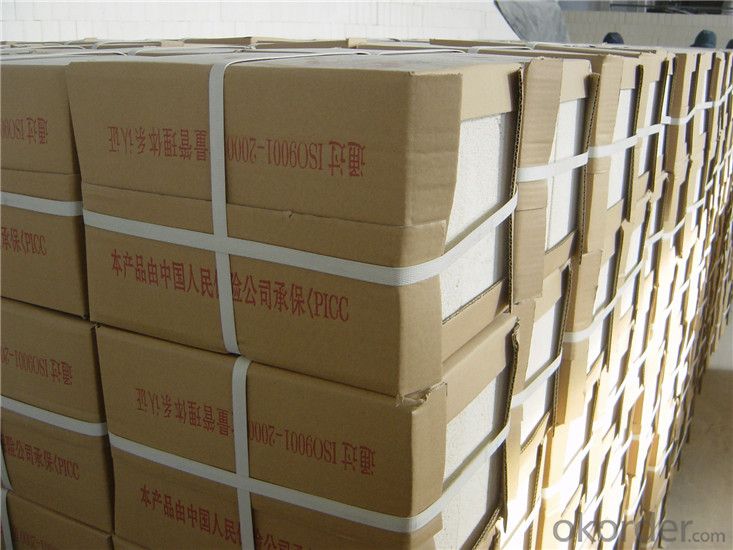
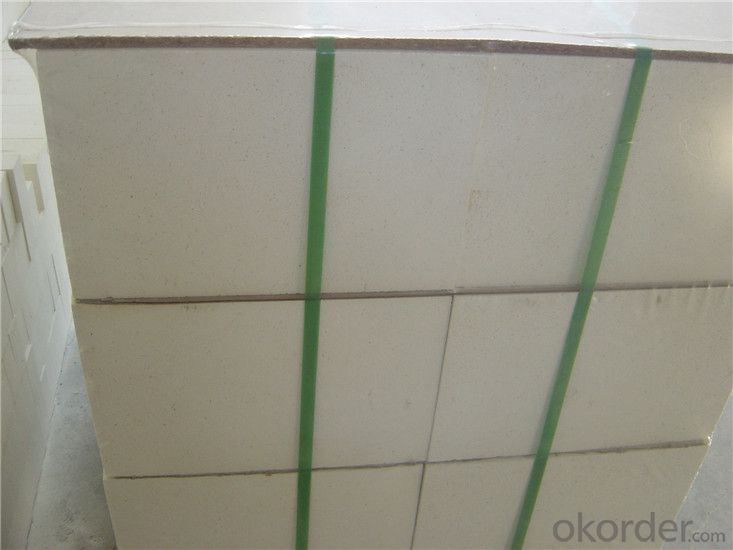
- Q:Do insulating fire bricks require regular maintenance?
- Insulating fire bricks are engineered to endure high temperatures and resist deterioration, thereby obviating the need for routine upkeep. Crafted from robust materials with exceptional insulating capabilities, they are impervious to wear and tear. Nevertheless, a periodic examination to detect any cracks, chips, or indications of impairment is imperative. In the event that damage is discovered, immediate repairs are essential to guarantee the bricks' optimal functionality. Moreover, regular cleansing of the bricks aids in the elimination of debris or residue accumulation, which can impede their insulating qualities. In summary, although infrequent maintenance is required for insulating fire bricks, periodic inspections and intermittent cleansing are advised to uphold their durability and efficacy.
- Q:Can insulating fire bricks be used in chimneys or flues?
- Insulating fire bricks are not recommended for use directly in chimneys or flues. While these bricks are designed to withstand high temperatures, they are primarily used for insulation purposes rather than as a structural component. Chimneys and flues require bricks that are specifically engineered to withstand the intense heat and corrosive byproducts of combustion. These bricks, known as refractory bricks, are designed to have high thermal resistance and exceptional durability to ensure the safe and efficient operation of the chimney or flue. Therefore, it is advisable to use refractory bricks instead of insulating fire bricks when constructing or repairing chimneys and flues.
- Q:Are insulating fire bricks suitable for use in kilns?
- Indeed, kilns can benefit greatly from the utilization of insulating fire bricks. These bricks have been specifically engineered to endure high temperatures and possess exceptional insulation properties. Crafted from lightweight materials with low thermal conductivity, they possess the ability to efficiently retain heat and minimize heat loss. Consequently, they serve as an ideal lining for kilns, as they aid in the maintenance of consistent and controlled temperatures. This not only enhances energy efficiency but also reduces fuel consumption. Furthermore, insulating fire bricks exhibit remarkable resistance to thermal shock, enabling them to withstand sudden and extreme temperature fluctuations without succumbing to cracks or breakages. All in all, the utilization of insulating fire bricks for kiln linings guarantees reliability, effectiveness, and the elongation of the kiln's lifespan.
- Q:What is the typical moisture content of an insulating fire brick?
- The typical moisture content of an insulating fire brick can vary depending on several factors such as the specific composition of the brick, the manufacturing process, and the storage conditions. However, in general, insulating fire bricks are designed to have a low moisture content to enhance their insulating properties and resistance to thermal shock. Typically, insulating fire bricks have a moisture content ranging from 0.5% to 2%. This low moisture content helps to prevent the bricks from cracking or spalling when exposed to high temperatures. It also minimizes the risk of moisture-related damage, such as freeze-thaw cycles or the release of steam when heated. To ensure the optimal performance and longevity of insulating fire bricks, it is recommended to store them in a dry environment and protect them from moisture during transportation and installation.
- Q:Can insulating fire bricks be used for insulation in chemical reactors?
- Insulation in chemical reactors can be achieved by utilizing insulating fire bricks. These bricks, made from lightweight materials like vermiculite or perlite, possess exceptional thermal insulation properties. They are specifically designed to endure high temperatures and can be applied in various scenarios, including chemical reactors. Chemical reactors often operate at heightened temperatures, making it crucial to maintain a stable temperature for efficient and safe functioning. By employing insulating fire bricks as insulation in chemical reactors, the loss of heat can be minimized, resulting in increased energy efficiency and cost savings. Furthermore, these bricks aid in reducing temperature variations within the reactor, ensuring even distribution of heat and enhancing overall performance. Moreover, insulating fire bricks exhibit resistance to chemical deterioration, enabling them to withstand the corrosive impact of different chemicals employed in chemical reactions. This quality makes them suitable for usage in chemical reactors frequently exposed to corrosive substances. To summarize, insulating fire bricks offer an exceptional choice for insulation in chemical reactors. They provide outstanding thermal insulation, endure high temperatures, and possess resistance to chemical attack. By utilizing insulating fire bricks in chemical reactors, improved energy efficiency, temperature stability, and overall reactor performance can be achieved.
- Q:Can insulating fire bricks be used in the construction of steel rolling mills?
- Yes, insulating fire bricks can be used in the construction of steel rolling mills. Insulating fire bricks are designed to have excellent thermal insulation properties, which makes them ideal for applications that require high temperatures and heat containment. In steel rolling mills, where high temperatures are involved, insulating fire bricks can be used to line the walls of furnaces, ovens, and other heat-processing equipment. These bricks help to reduce heat loss, increase energy efficiency, and maintain a stable temperature environment, which is crucial in the steel rolling process. Additionally, insulating fire bricks are lightweight and easy to install, making them a practical choice for construction in steel rolling mills.
- Q:Can insulating fire bricks be used for insulation in residential walls?
- Insulating fire bricks are primarily designed for high-temperature applications, such as in kilns or furnaces. While they do provide excellent insulation properties, they are not typically recommended for use in residential walls. The reason is that insulating fire bricks may not meet the specific building codes and regulations required for residential construction. Additionally, there are other insulation materials available that are better suited for residential walls, such as fiberglass or foam insulation, which are more cost-effective and easier to install.
- Q:Can insulating fire bricks be used in the construction of smelting crucibles?
- Yes, insulating fire bricks can be used in the construction of smelting crucibles. The high heat resistance and insulating properties of these bricks make them suitable for withstanding the extreme temperatures required in the smelting process.
- Q:Are insulating fire bricks resistant to phosphorus pentoxide?
- In general, insulating fire bricks lack resistance against phosphorus pentoxide. This highly reactive compound has the ability to corrode and deteriorate various materials, including insulating fire bricks. Therefore, it is crucial to contemplate alternative materials or apply protective coatings when specific applications require resistance against phosphorus pentoxide.
- Q:Can insulating fire bricks be used for insulation in industrial chimneys?
- Yes, insulating fire bricks can be used for insulation in industrial chimneys. Insulating fire bricks are designed to withstand high temperatures and provide excellent thermal insulation. Their low thermal conductivity helps to reduce heat loss, increase energy efficiency, and maintain high temperatures inside the chimney. Consequently, they are commonly used in industrial chimneys to enhance insulation and improve overall performance.
1. Manufacturer Overview |
|
|---|---|
| Location | |
| Year Established | |
| Annual Output Value | |
| Main Markets | |
| Company Certifications | |
2. Manufacturer Certificates |
|
|---|---|
| a) Certification Name | |
| Range | |
| Reference | |
| Validity Period | |
3. Manufacturer Capability |
|
|---|---|
| a)Trade Capacity | |
| Nearest Port | |
| Export Percentage | |
| No.of Employees in Trade Department | |
| Language Spoken: | |
| b)Factory Information | |
| Factory Size: | |
| No. of Production Lines | |
| Contract Manufacturing | |
| Product Price Range | |
Send your message to us
Far Infrared Heating Fire Clay Insulation Clay Bricks
- Loading Port:
- Shanghai
- Payment Terms:
- TT OR LC
- Min Order Qty:
- 1 m.t.
- Supply Capability:
- 1000 m.t./month
OKorder Service Pledge
OKorder Financial Service
Similar products
New products
Hot products
Hot Searches
Related keywords
